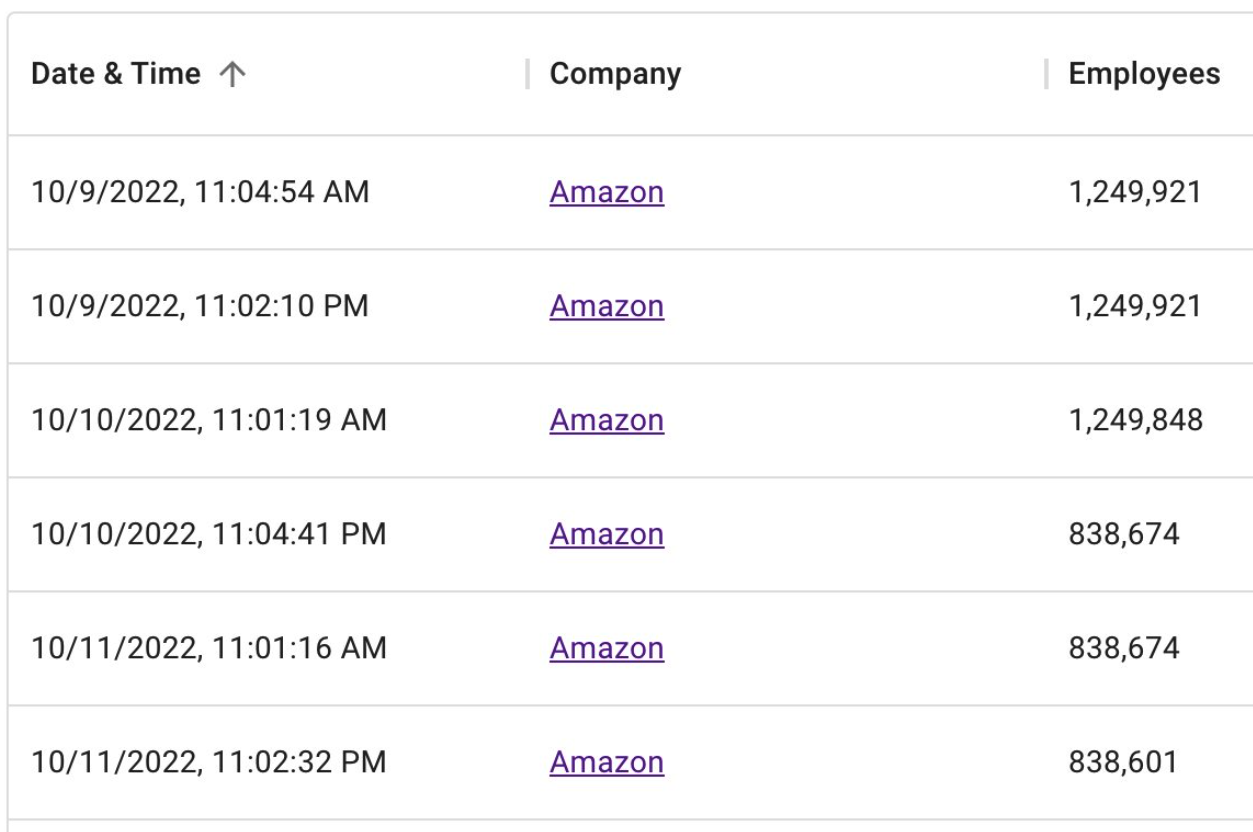On October 10, 2022, there were 576,562 LinkedIn accounts that listed their current employer as Apple Inc. The next day, half of those profiles no longer existed. A similarly dramatic drop in the number of LinkedIn profiles claiming employment at Amazon comes as LinkedIn is struggling to combat a significant uptick in the creation of fake employee accounts that pair AI-generated profile photos with text lifted from legitimate users.
Jay Pinho is a developer who is working on a product that tracks company data, including hiring. Pinho has been using LinkedIn to monitor daily employee headcounts at several dozen large organizations, and last week he noticed that two of them had far fewer people claiming to work for them than they did just 24 hours previously.
Pinho’s screenshot below shows the daily count of employees as displayed on Amazon’s LinkedIn homepage. Pinho said his scraper shows that the number of LinkedIn profiles claiming current roles at Amazon fell from roughly 1.25 million to 838,601 in just one day, a 33 percent drop:
The number of LinkedIn profiles claiming current positions at Amazon fell 33 percent overnight. Image: twitter.com/jaypinho
As stated above, the number of LinkedIn profiles that claimed to work at Apple fell by approximately 50 percent on Oct. 10, according to Pinho’s analysis:
Image: twitter.com/jaypinho
Neither Amazon or Apple responded to requests for comment. LinkedIn declined to answer questions about the account purges, saying only that the company is constantly working to keep the platform free of fake accounts. In June, LinkedIn acknowledged it was seeing a rise in fraudulent activity happening on the platform.
KrebsOnSecurity hired Menlo Park, Calif.-based SignalHire to check Pinho’s numbers. SignalHire keeps track of active and former profiles on LinkedIn, and during the Oct 9-11 timeframe SignalHire said it saw somewhat smaller but still unprecedented drops in active profiles tied to Amazon and Apple.
“The drop in the percentage of 7-10 percent [of all profiles], as it happened [during] this time, is not something that happened before,” SignalHire’s Anastacia Brown told KrebsOnSecurity.
Brown said the normal daily variation in profile numbers for these companies is plus or minus one percent.
“That’s definitely the first huge drop that happened throughout the time we’ve collected the profiles,” she said.
In late September 2022, KrebsOnSecurity warned about the proliferation of fake LinkedIn profiles for Chief Information Security Officer (CISO) roles at some of the world’s largest corporations. A follow-up story on Oct. 5 showed how the phony profile problem has affected virtually all executive roles at corporations, and how these fake profiles are creating an identity crisis for the businesses networking site and the companies that rely on it to hire and screen prospective employees.
A day after that second story ran, KrebsOnSecurity heard from a recruiter who noticed the number of LinkedIn profiles that claimed virtually any role in network security had dropped seven percent overnight. LinkedIn declined to comment about that earlier account purge, saying only that, “We’re constantly working at taking down fake accounts.”
A “swarm” of LinkedIn AI-generated bot accounts flagged by a LinkedIn group administrator recently.
It’s unclear whether LinkedIn is responsible for this latest account purge, or if individually affected companies are starting to take action on their own. The timing, however, argues for the former, as the account purges for Apple and Amazon employees tracked by Pinho appeared to happen within the same 24 hour period. Continue reading Battle with Bots Prompts Mass Purge of Amazon, Apple Employee Accounts on LinkedIn
